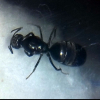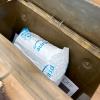Thanks for your replies, guys.
I wasn't clear in my question.
I know they collect semen from different alate males during nupcial flights (therefore, that's a limited resource) but I just meant egg production, not their fertilization.
I also know they can choose to fertilize or not to fertilize an egg (that's incredible!), and that's how they feed the first batch of larvae that need protein that has to come from the queen's eggs while there's no one else around to get an external protein source, and she chooses not to fertilize them so not to waste the limited storage of semen.
Let me put a practical context:
I have some Messor queens that are a few months old, I caught them in November and then the cold times came and they entered hibernation (this timing doesn't make sense to me but it seems to be how they work, so...).
After hibernation most of them survived and most of them laid eggs. Back then I didn't have test tubes so I placed them in a syringe, but that has a very small ability to store water compared to a test tube, so most of the went completely dry and I had to move them regardless.
After getting the test tubes I moved them into them, but a couple of them didn't go smoothly and I believe they freaked out and have eaten their eggs (that's a known behavior).
So I'm curious if they will lay eggs again, considering the circumstances.
I know their energy reserves and time to be able to birth the 1st offspring are limited...
I'm also wondering if I should feed them a small dead fruit fly or just leave them be.
If they don't have new eggs they won't eat them, but would they accept this food?
What would be better for these queens?
I'd rather ask first than do them harm again, poor creatures have suffered enough in my inexperienced hands...


















